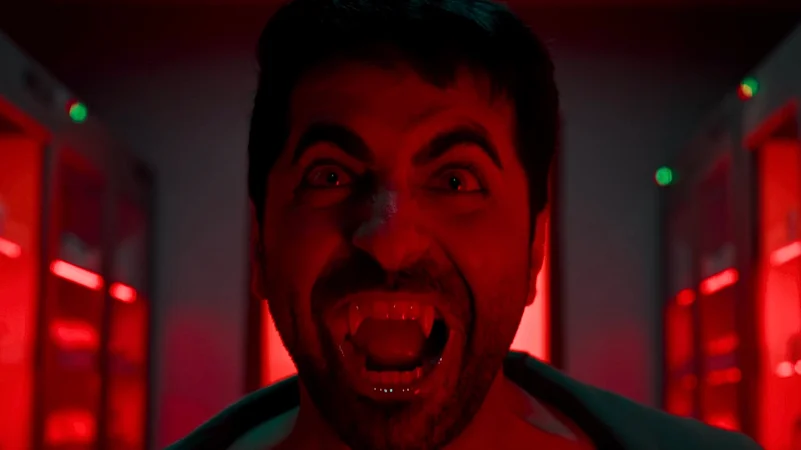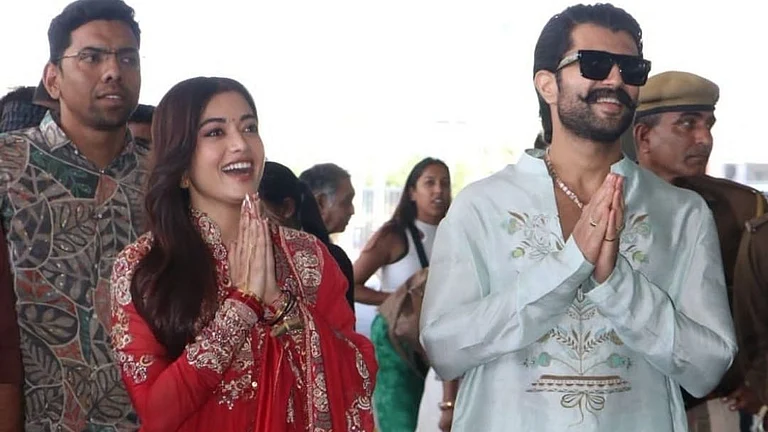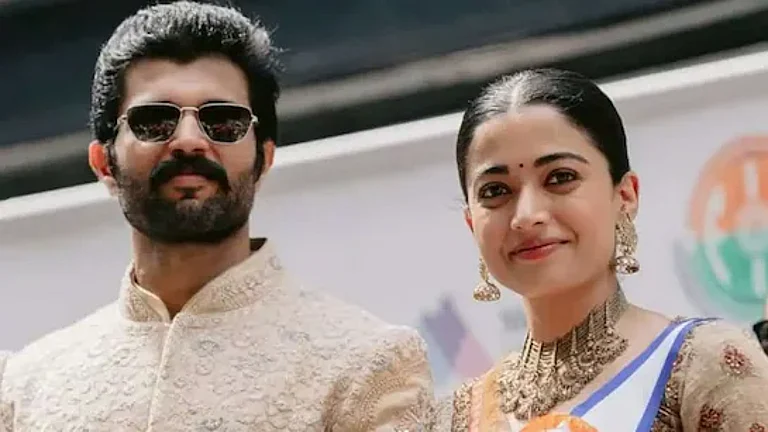
Summary of this article
Thamma (2025) is directed by Aditya Sarpotdar, known for his work on Munjya (2024), with the screenplay penned by Niren Bhatt, Suresh Mathew, and Arun Fulara.
The film stars Ayushmann Khurrana, Rashmika Mandanna, Nawazuddin Siddiqui and Paresh Rawal in pivotal roles.
Set in the Maddock Horror Comedy Universe, Thamma follows journalist Alok, who becomes entangled in a supernatural love story after meeting Tadaka, a betaal, leading to a battle against dark forces.
There’s no doubt vampire-character led films have dominated the year— from Sinners (2025) to Sister Midnight (2025), Dracula: A Love Tale (2025), Lokah Chapter One: Chandra (2025) culminating to Ayushmann Khurrana and Rashmika Mandanna starrer Thamma (2025). Director Aditya Sarpotdar takes an ambitious swing—a vampire love saga branching out from the roots of Stree (2018), Bhediya (2022), and Munjya (2024). This instalment though, introduced a new species, the “Betaal“ marking what could’ve been a thrilling evolution of the universe. Maddock’s ever-expanding horror-comedy universe stakes its claim by mining Indian folklore and supernatural myth, into a comedic-horror tapestry that rewards audiences who recognise its recurring world. It’s intentionally playful and unapologetically self-referential, though the cleverness often doubles as a convenient narrative smokescreen. Does this crossover obsession enrich the mythology, or does it serve as a crutch to mask narrative thinness?
While expecting a very Pyaar Kii Ye Ek Kahaani (2010) coded Indian-vampire love story from the trailer, this film went on to visually deliver just that. There’s actual scenes of Alok (Ayushmann Khurrana) and Tadaka (Rashmika Mandanna) leaping across high-rise buildings together reminiscent of Dr Anika (Kriti Sanon) and Bhaskar (Varun Dhawan) prancing across the jungle in Bhediya, or Bella and Edward doing the same in The Twilight Saga: Breaking Dawn Part 2 (2012). While vampires have forever been used as metaphors of various kinds, Thamma surprisingly picks up a political string and drags it along the screenplay, like a mindless cat, or in this case, a wolf. It’s 323 BC and Sikandar (Alexander, the Great) is marching down a dark forest before encountering a nationalist betaal Yakshasan (Nawazuddin Siddiqui) who attacks him for trying to conquer India.

Betaals have their own clauses and rules, mainly to protect the country from evil until the lens shifts to post-independence riots and the aftermath of people killing each other in cold blood. Vampires as protectors of people teeter on contradiction, almost like politicians championing democracy in a country like ours. Although the Maddock horror-comedy universe has frequently employed mythic characters protecting nature, humanity and their lovers quite consistently. The initial segment of the film carried immense potential to comment more intently upon communal violence and weaving the screenplay around it but it loses its fangs eventually.
Journalist Alok, played by Khurrana, is a mishmash of Dhawan and Rajkummar Rao from previous Maddock films—goofy, lovable, and smitten. Ram Bajaj Goyal (Paresh Rawal), is Alok’s conspiracy theorist father, who is introduced in the familiar comic skin he’s always known to play. The comedic jugalbandi between Alok and Ram is promising yet stitched together with meta-dialogues that don’t quite land in the long run. Fate brings Alok close to Tadaka, a betaal who saves his life from a fatal bear attack. She’s drawn to the thumping of his heartbeat and he’s drawn to, well, what every creepy man is drawn to a woman for.

For a screenplay banking on this love story, their chemistry is decent but fizzles out by the second half. The skeleton of Thamma forces us to feel for this couple that has immediately fallen in love at first glance. Somewhere along the way, Alok turns into a betaal, as inferred from the trailer, and Ram asks Tadaka why she couldn’t find someone from “her community” to love. “Transgressive love against all odds” is an excellent trope to explore parallels for queer or even interfaith relationships. Although here, unlike Lokah: Chapter 1: Chandra, where love grows, carries stakes over time, their attachment barely resonates, leaving one questioning—why exactly should we root so fiercely for them?
The few good things about Thamma remain the inclusion of mythic folklore around vampires witnessing centuries of Indian history and being mildly political. Mandanna’s Tadaka is quite interesting as a character but heavily sexualised as the innocent yet powerful seductress. Doesn’t help that the film inserts not one, but three unnecessary item songs to amp up the objectification factor. Siddiqui, Aparshakti Khurrana and Abhishek Banerjee’s brilliance flickers, but not enough to redeem the flesh the film has sucked dry. Personally not someone to ponder much upon costume design but it’s noticeably quite disastrous here.

The horror-comedy genre, while shaping opportunities for experimentation, risks maintaining the balance and swerving into absurdity, which isn’t a bad thing but Thamma barely even tries. The second half at least attempts some lore-building, though by then, the damage is irreversible. The scale of the supernatural modus-operandi of justice takes precedence over the story itself. The screenplay leans on convenience, like the punchline of a joke that’s gone on too long. The signature red and blue Maddock colors contrast well within the perpetually night-shot scenes.
The film tiptoes around horror like it’s afraid of its own premise and its own politics. Even the sound design, usually Maddock’s strongest weapon—feels disengaged. In its two-hour twenty-nine minute runtime, the film gets in its own way, tying loose ends together leading up to a predictable climax.

Journalism trumping corruption is a fantastic metaphor but Khurrana’s stale sheepishness, Mandanna’s restrained Hindi and a film competing with itself to recall as many Maddock references as it can, just…sucks. Nothing beats (a Jet 2 holiday) and the sour look on my face as I’m forced to witness multiple reenactments of the cringe “Dame Un Grr” Instagram trend in this film.
Sarpotdar’s direction feels scattered, never finding the rhythm or tone the film so desperately needs. Even visually, Thamma is a huge let down as the VFX doesn’t look as convincing or cohesive enough. In the end, Thamma makes empty promises of a Stree-like high but is left with the inferior remnants of Bhediya. It’s a feeble echo of a once-brilliant experiment now stumbling under its own weight. Maybe the real horror here isn’t the betaal—it’s watching a once-great franchise lose their bite.
























